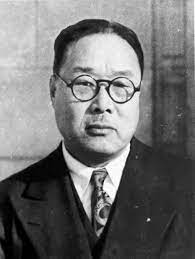You can help expand this article with text translated from the corresponding article in Korean. (March 2022) Click [show] for important translation instructions.
|
Yi Yun-yong | |
|---|---|
 | |
| Acting Prime Minister of South Korea | |
| In office April 24, 1952 – May 6, 1952 | |
| President | Syngman Rhee |
| Preceded by | Chang Myon |
| Succeeded by | Jang Taek-sang |
| Personal details | |
| Born | August 19, 1890 Yŏngbyŏn, P'yŏngan Province, Joseon |
| Died | October 15, 1975 (aged 85) Seoul, South Korea |
| Korean name | |
| Hangul | 이윤영 |
| Hanja | |
| Revised Romanization | I Yun-yeong |
| McCune–Reischauer | Yi Yunyŏng |
Yi Yun-young (李允榮, August 19, 1890 – October 15, 1975) was an independence activist, educator, and Methodist minister during the Japanese occupation of Korea. His family clan originated in Danyang, and he was from Yongbyon in Pyonganbuk-do. His art name was Baeksa. During the March 1st Independence Movement, he was arrested for holding a lecture declaring independence and protesting against the Japanese occupation. In 1940, his pastoral qualifications were suspended because he opposed the unification of the churches in Korea and Japan and refused to adapt Sōshi-kaimei. After the Liberation, he participated with Cho Man-sik in the Committee for the Preparation of Korean Independence, founded the Korean Democratic Party, and was active as the party's vice leader. After his escape to the South, he was recommended as acting prime minister. After the establishment of Korea's government, he was named to be the first prime minister, but he was defeated because of the rejection of his confirmation by the Korea Democratic Party. After that, he was named to be the prime minister three more times, but each time he was rejected. Being one of Syngman Rhee's closest allies, he served as Minister without Portfolio and Minister of Social Affairs during the First Republic. He ran for vice president representing the anti-Lee Ki-poong faction but was defeated. After the May 16th Coup, he was Chairman of the Committee for Struggle against the prolongation of Military Government and executive member of the People's Party. He was an aide of Cho Man-sik, then after he defected to the South, he worked as an aide to Syngman Rhee.